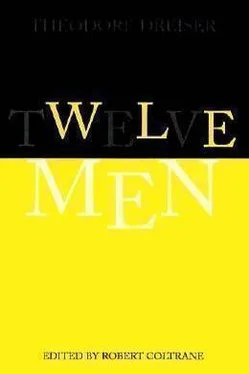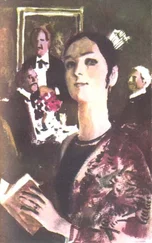Теодор Драйзер - Twelve Men
Здесь есть возможность читать онлайн «Теодор Драйзер - Twelve Men» весь текст электронной книги совершенно бесплатно (целиком полную версию без сокращений). В некоторых случаях можно слушать аудио, скачать через торрент в формате fb2 и присутствует краткое содержание. Год выпуска: 2014, Издательство: epubBooks Classics, Жанр: Биографии и Мемуары, на английском языке. Описание произведения, (предисловие) а так же отзывы посетителей доступны на портале библиотеки ЛибКат.
- Название:Twelve Men
- Автор:
- Издательство:epubBooks Classics
- Жанр:
- Год:2014
- ISBN:нет данных
- Рейтинг книги:4 / 5. Голосов: 1
-
Избранное:Добавить в избранное
- Отзывы:
-
Ваша оценка:
- 80
- 1
- 2
- 3
- 4
- 5
Twelve Men: краткое содержание, описание и аннотация
Предлагаем к чтению аннотацию, описание, краткое содержание или предисловие (зависит от того, что написал сам автор книги «Twelve Men»). Если вы не нашли необходимую информацию о книге — напишите в комментариях, мы постараемся отыскать её.
Twelve Men — читать онлайн бесплатно полную книгу (весь текст) целиком
Ниже представлен текст книги, разбитый по страницам. Система сохранения места последней прочитанной страницы, позволяет с удобством читать онлайн бесплатно книгу «Twelve Men», без необходимости каждый раз заново искать на чём Вы остановились. Поставьте закладку, и сможете в любой момент перейти на страницу, на которой закончили чтение.
Интервал:
Закладка:
Skepticism still lingered with me for a time, but when I saw the second train growing, the figures and apparatus gradually being modeled, and the correspondence and conferences going on between the artist and several companies which wished to gain control of the result, I was perfectly sure that his idea would some day be realized.
As I have said, when I first met S― he had not realized any of his dreams. It was just at that moment that the tide was about to turn. He surprised me by the assurance, born of his wonderful virility, with which he went about all things.
"I've got an order from the Ladies' Home Journal ," he said to me one day. "They came to me."
"Good," I said. "What is it?"
"Somebody's writing up the terminal facilities of New York."
He had before him an Academy board, on which was sketched, in wash, a midnight express striking out across the Jersey meadows with sparks blazing from the smoke stacks and dim lights burning in the sleepers. It was a vivid thing, strong with all the strength of an engine, and rich in the go and enthusiasm which adhere to such mechanisms.
"I want to make a good thing of this," he said. "It may do me some good."
A little later he received his first order from Harper's. He could not disguise that he was pleased, much as he tried to carry it off with an air. It was just before the Spanish war broke out, and the sketches he was to do related to the navy.
He labored at this order with the most tireless enthusiasm. Marine construction was his delight anyhow, and he spent hours and days making studies about the great vessels, getting not only the atmosphere but the mechanical detail. When he made the pictures they represented all that he felt.
"You know those drawings?" he said the day after he delivered them.
"Yes."
"I set a good stiff price on them and demanded my drawings back when they were through."
"Did you get them?"
"Yep. It will give them more respect for what I'm trying to do," he said.
Not long after he illustrated one of Kipling's stories.
He was in high feather at this, but grim and repressed withal. One could see by the nervous movements of his wiry body that he was delighted over it.
At this time Kipling came to his studio. It was by special arrangement, but S― received him as if he were—well, as artists usually receive authors. They talked over the galley proofs, and the author went away.
"It's coming my way now," he said, when he could no longer conceal his feelings. "I want to do something good on this."
Through all this rise from obscurity to recognition he lived close to his friends—a crowd of them, apparently, always in his studio jesting, boxing, fencing—and interested himself in the mechanics I have described. His drawing, his engine–building, his literary studies and recreations were all mixed, jumbled, plunging him pell–mell, as it were, on to distinction. In the first six months of his studio life he had learned to fence, and often dropped his brush to put on the mask and assume the foils with one of his companions.
As our friendship increased I found how many were the man's accomplishments and how wide his range of sympathies. He was an expert bicyclist, as well as a trick rider, and used a camera in a way to make an amateur envious. He could sing, having a fine tenor voice, which I heard the very day I learned that he could sing. It so happened that it was my turn to buy the theater tickets, and I invited him to come with me that especial evening.
"Can't do it," he replied.
"All right," I said.
"I'm part of an entertainment tonight, or I would," he added apologetically.
"What do you do?" I inquired.
"Sing."
"Get out!" I said.
"So be it," he answered. "Come up this evening."
To this I finally agreed, and was surprised to observe the ease with which he rendered his solo. He had an exquisitely clear and powerful voice and received a long round of applause, which he refused to acknowledge by singing again.
The influence of success is easily observable in a man of so volatile a nature. It seems to me that I could have told by his manner, day by day, the inwash of the separate ripples of the inrolling tide of success. He was all alive, full of plans, and the tale of his coming conquests was told in his eye. Sometime in the second year of our acquaintance I called at his studio in response to a card which he had stuck under my office door. It was his habit to draw an outline head of himself, something almost bordering upon a caricature, writing underneath it "I called," together with any word he might have to say. This day he was in his usual good spirits, and rallied me upon having an office which was only a blind. He had a roundabout way of getting me to talk about his personal affairs with him, and I soon saw that he had something very interesting, to himself, to communicate. At last he said,—
"I'm going to Europe next summer."
"Is that so?" I replied. "For pleasure?"
"Well, partly."
"What's up outside of that?" I asked.
"I'm going to represent the American Architectural League at the international convention."
"I didn't know you were an architect," I said.
"Well, I'm not," he answered, "professionally. I've studied it pretty thoroughly."
"Well, you seem to be coming up, Louis," I remarked.
"I'm doing all right," he answered.
He went on working at his easel as if his fate depended upon what he was doing. He had the fortunate quality of being able to work and converse most entertainingly at the same time. He seemed to enjoy company under such circumstances.
"You didn't know I was a baron, did you?" he finally observed.
"No," I answered, thinking he was exercising his fancy for the moment. "Where do you keep your baronial lands, my lord?"
"In Germany, kind sir," he replied, banteringly.
Then in his customary excitable mood he dropped his brushes and stood up.
"You don't believe me, do you?" he exclaimed, looking over his drooping glasses.
"Why, certainly I believe you, if you are serious. Are you truly a baron?"
"It was this way," he said. "My grandfather was a baron. My father was the younger of two brothers. His brother got the title and what was left of the estate. That he managed to go through with, and then he died. Now, no one has bothered about the title—"
"And you're going back to claim it?"
"Exactly."
I took it all lightly at first, but in time I began to perceive that it was a serious ambition. He truly wanted to be Baron S― and add to himself the luster of his ancestors.
With all this, the man was really not so much an aristocrat in his mood as a seeker after life and new experiences. Being a baron was merely a new experience, or promised to be. He had the liveliest sympathies for republican theories and institutions—only he considered his life a thing apart. He had a fine mind, philosophically and logically poised. He could reason upon all things, from the latest mathematical theorem to Christian Science. Naturally, being so much of an individualist, he was not drifting toward any belief in the latter, but was never weary of discussing the power of mind—a universal mind even—its wondrous ramifications and influences. Also he was a student of the English school of philosophy, and loved to get up mathematical and mechanical demonstrations of certain philosophic truths. Thus he worked out by means of a polygon, whose sides were of unequal lengths, a theory of friendship which is too intricate to explain here.
From now on I watched his career with the liveliest interest. He was a charming and a warm friend, and never neglected for a moment the obligations which such a relationship demands.
I heard from him frequently in many and various ways, dined with him regularly every second or third week, and rejoiced with him in his triumphs, now more and more frequent. One spring he went to Europe and spent the summer in tracing down his baronial claims, looking up various artists and scientists and attending several scientific meetings here and there at the same time. He did the illustrations for one of Kipling's fast express stories which one of the magazines published, and came back flushed and ready to try hard for a membership in the American Water–Color Society.
Читать дальшеИнтервал:
Закладка:
Похожие книги на «Twelve Men»
Представляем Вашему вниманию похожие книги на «Twelve Men» списком для выбора. Мы отобрали схожую по названию и смыслу литературу в надежде предоставить читателям больше вариантов отыскать новые, интересные, ещё непрочитанные произведения.
Обсуждение, отзывы о книге «Twelve Men» и просто собственные мнения читателей. Оставьте ваши комментарии, напишите, что Вы думаете о произведении, его смысле или главных героях. Укажите что конкретно понравилось, а что нет, и почему Вы так считаете.









